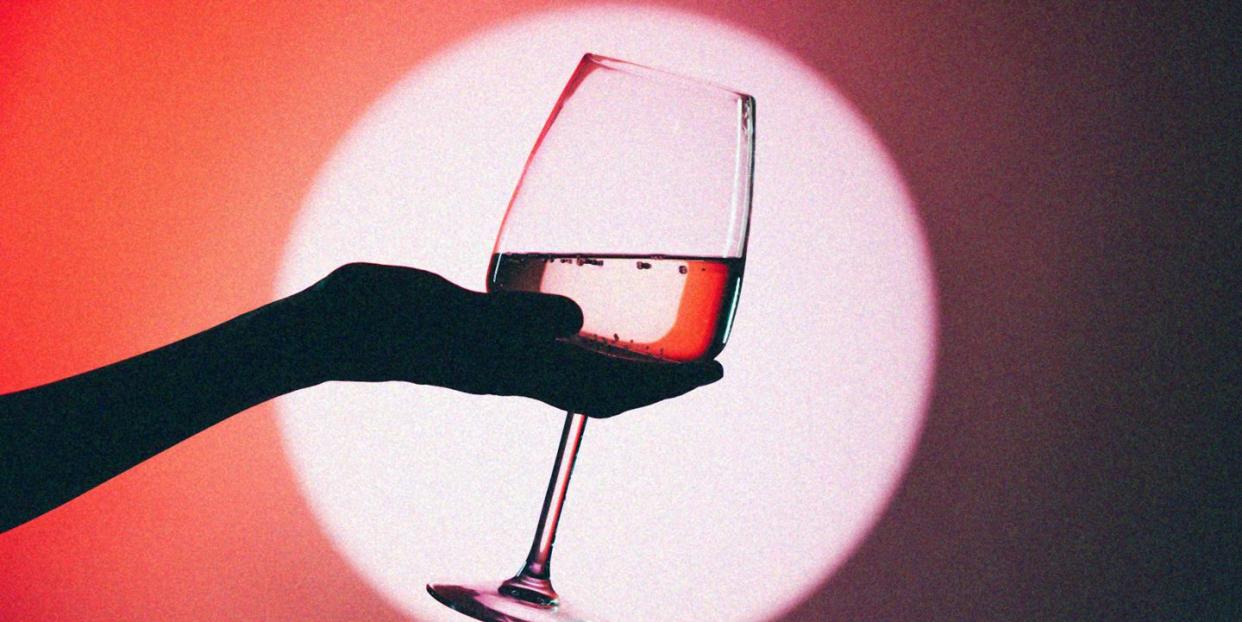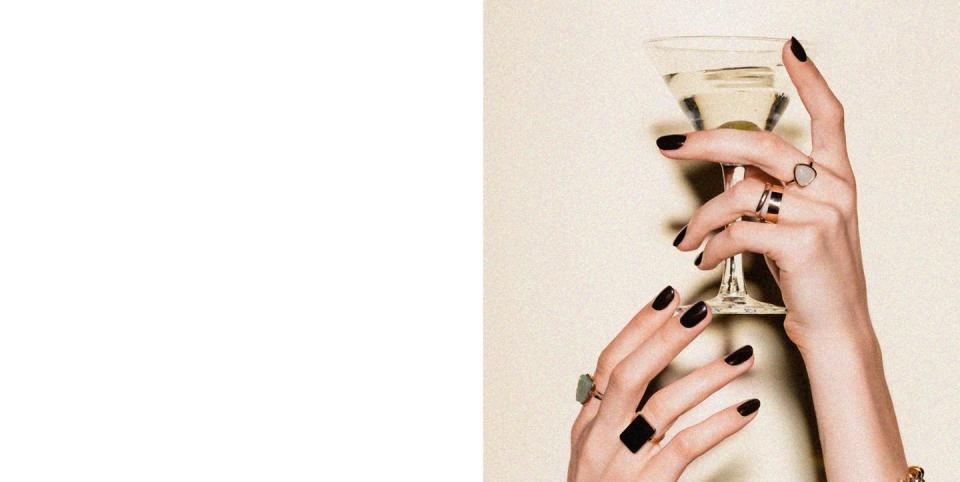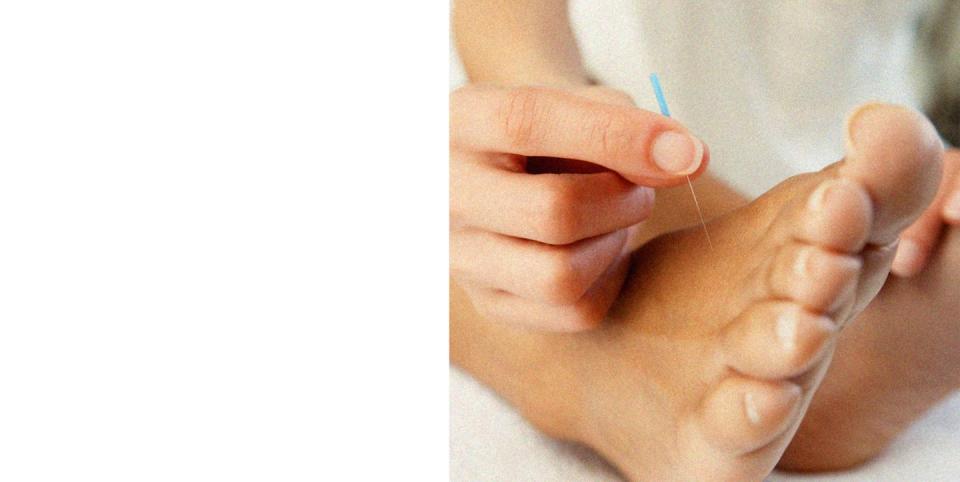'I tried acupuncture to stop binge drinking – here’s what happened next'

Let me take you back. It’s January 2021 and partway through an episode of And Just Like That a revelation hit me: I couldn’t remember the last day that had passed without me having had an alcoholic drink. Was I blacking out every night? No. Was I downing an entire bottle of vodka alone? Also no. But, while watching the show, it dawned on me that I still might have a drinking problem – and one I ought to address.
I’ve always been a self-proclaimed ‘Miranda’ and originally sighed when they gave her the problematic storyline of being an alcoholic. Hadn’t the writers already messed with her enough when Steve cheated on her? But my feelings quickly changed when I started paying proper attention.
I realised it was the first time I’d ever been presented with the idea of a female functioning alcoholic. Like me, Miranda wasn’t too drunk to do her job or blacking out, her issues with booze were more subtle – and that resonated.
Personally, my drinking habits massively escalated thanks to the pandemic. Perhaps me grabbing any bottle of gin I could find while others frantically stocked up on toilet rolls and baked beans ought to have been a warning sign, but it didn’t register at the time. I just knew that I couldn’t under any circumstances be sober during a pandemic. One (or three) G&Ts every evening helped me to transition from ‘work’ to ‘evening’ during a turbulent time, and I wasn’t alone. In fact, Alcohol Change UK found that 8.6 million UK adults drank more frequently in lockdown and as a result, statistics show alcohol-related deaths were at their highest ever in 2022. How many others kept up that rate of boozing, like me?

In truth, I can probably trace my problems further back too. As a teenager, I once drunkenly ended up in A&E (minus a shoe) with zero recollection as to why or how (and then went out the following night to do it all again - hospital visit aside). I've woken up with purple bruises all down my shin, unable to walk properly the next day. Oh, and previously found shards of glass in my foot following a big night out... but I didn’t have a real problem, right? I was just ‘fun’. Doing what ‘normal’ young British women do. Right?
Shocked at being hit so hard by the on-screen storyline, I followed in Miranda’s footsteps and picked up a copy of Quit Like a Woman and downloaded Drinker’s Helper, an app designed to help me control my intake. As someone who didn’t go into the task thinking they had a serious alcohol dependency problem and simply wanted to be healthier, I was alarmed at my lack of restraint. The timing coincided with my return from an all-inclusive holiday too, which, thanks to jetlag, had me craving daiquiris at 5am and red wine by 11am.
When I mentioned my plan of change to friends, explaining I was cutting back (not even eliminating) I was met with scoffs and choruses of ‘but drinking is your thing!’. Some even questioned why would I sabotage my ‘hardy tolerance’. Alarm bells sounded a little louder.
Following NHS guidance, I set a six-drink per week limit on my app. Considering I could happily drink a bottle of wine on a night in alone (if I went out, this was likely to be a lot more), this was a huge cutback. I went over my cap three weeks out of four... by a lot. My approach clearly wasn’t working and so in my mind, the obvious thing was to give up – despite being somewhat worried that this problem would only worsen further down the line. I buried it in the back of my mind, abandoned my quest for sobriety and went back to my daily drinking routine.
Skip to July 2023, just days before my 28th birthday, and I was at a work event waiting for a slot with renowned acupuncturist Ross J. Barr. I am by no means an oversharer – I don’t even tell my friends the names of guys I date – so I shocked myself when I openly admitted to him that I just wanted to be less angry all the time. Something I didn’t even know I felt until I said it out loud. The tiniest thing would cause my brain to boil with rage, whether it be a delayed bus or a slow-walking tourist. I knew I was often irrational, but I didn't care. I was just so mad. He checked my pulse (a key diagnosis method in the world of Chinese medicine), noted that my liver was “erratic” and asked if I was a heavy drinker. Skeptically I explained that I drank almost daily and asked if my anger and my drinking could be linked. Turns out, the answer is yes.
“Traditional Chinese medicine theorises that disproportionate emotions – whether good or bad – can cause a physical effect on the body,” Barr told me. The liver, in particular, links to feelings of anger. “It’s the specific organ that responds to frustration and can almost shake with anger or unsaid words. If anything shakes long enough, it can generate heat,” he added. Chinese medicine and liver theories aside, it's also a fact that alcohol generates a whole host of problems for the body, from preventing restorative REM sleep to causing chemical changes in the brain (that make us feel everything from sadness to anger). It is a depressant, after all.
According to Barr, my emotions had a similar composition as a radiator (bear with me); I was radiating rage and the pressure needed to be released, and this, he said, is what acupuncture can apparently offer. Otherwise, this heat leads to cravings, like chocolate or sex, or in my case booze. Barr divulged that acupuncture can help “calibrate the organ’s function, to help invigorate it to do its job more efficiently. You're encouraging the blood flow through the liver, so you'll help disperse the heat”. Basically, it helps rebalance.
I’d never tried acupuncture before (it all seemed a bit wishy-washy to me), but Barr explained he’d had some success in treating different forms of addiction through it. Obviously, the treatment has its limitations and if you’ve got a serious addiction this won’t be a one-stop solution. But given my attempts at more traditional methods had failed, I was cynical but intrigued – and agreed to try.

The first session with Barr at the work event was brief (only 20 minutes) and we mostly spoke about what triggers my anger issues while acupuncture needles were carefully placed into the tops of my feet. Apparently, the feet are where all the rage in the body gets stored and acupuncture hopefully releases some pressure. I was then instructed to avoid drinking for five days. This was impossible, I told him, it was my birthday in two.
With that in mind, Barr instead advised me to try my best and “avoid dickheads for 24 hours” to keep my anger levels to a minimum – easier said than done. I managed just two days off the booze (the same can’t be said for the dickheads, sadly), which really did feel like progress at the time. However, after my first session, I dropped the ball and essentially returned to my daily drinking schedule.
Session two happened a few weeks later. This time around it was a full hour, which gave Barr and I more of a chance to get the root cause of my drinking, which he believes is key to dealing with any form of addiction. After chatting through everything from my parents to my office dynamics, I realised my desire to drink was much more entwined with my emotions than I’d suspected. As such, I was instructed to avoid drinking when I felt sad, anxious, angry or anything else veering on negative. Instead, I could only allow myself a drink when I was happy or if my feelings had plateaued.
My appointment was on a Tuesday and I was instructed not to drink until Friday or Saturday if I could manage. Simply being able to fully grasp how negativity had turned my relationship with alcohol toxic was enough to help me reassess why I wanted a drink in the first place and this time, stick to it. Did I really need a martini? Or was I just internalising my frustration and lashing out at myself? This mini-therapy session and epiphany kept me sober for an entire week – something that hadn’t happened in roughly four years.
As it was my second time going for acupuncture, I noticed a pattern too; I would be miserable – as in, can not get out of bed miserable – the day after, which I flagged during my third session. Barr explained that acupuncture releases trauma from the body, so there was a chance I was experiencing an ‘emotional hangover’. To counteract the melancholy, he added needles into my hands, as well as my feet. The hands link to the large intestine and heart and can stimulate pressure points to relieve anxiety and depression, Barr said. It appeared to work; I didn’t experience an emotional lull the following day.
This time, my task was to stay sober for an entire month. Previously when friends asked if I wanted to join them with Dry January, I’d laugh it off by saying “But that’s the best time of the year to drink because it’s so miserable!”, but in reality, I’d always feared I could never last a month without alcohol. But now that my drinking was down to once or twice a week max, I was more determined than ever.
I didn’t experience the cravings I’d once had when trying to go cold turkey before. In fact, it seemed like my body had forgotten to crave booze altogether – something I could only attribute to acupuncture, as I hadn’t done anything else differently. I even went on dates sober. It was the proudest I’d ever been of myself in my adult life. My alcohol-free month flew by, so much so, I stretched it out until six weeks before having a drink; a martini at home. It was glorious and just one was enough.
Was it really all thanks to the needles though? Barr believes acupuncture can work alongside therapy to boost results – and he’s not the only one. “There is a substantial amount of research on acupuncture in the context of addiction,” acupuncturist Maudie Evitt tells me. She says she’s treated a lot of people post-lockdown to help stop them from drinking, too.
“There’s a hormonal change within the person [following acupuncture] that aids the support of recovery from addiction or substance use. The hormones that increase during treatment (to name a few) are endorphins, serotonin and dopamine,” she says. These help you feel less inclined to reach for the bottle.
“The central nervous system is stimulated during sessions too, increasing the aforementioned hormonal or biochemical changes in the body,” Evitt adds.
That said, it must be recognised that addiction is a serious subject and everyone is entirely different. When discussing the power of acupuncture with Counselling Psychologist and trained Addiction Counsellor, Dr Jane Halsall, she was keen to stress the treatment's limitations. “Acupuncture can be used as a complementary approach by reducing cravings, stimulating endorphins (the body’s natural pain relief) and managing withdrawal symptoms. It’s an effective treatment but only in combination with therapy and other evidence-based approaches,” she explains.
Evitt believes while acupuncture can’t “cure” those with addiction issues, it can “support withdrawal, detoxification and mental health issues that can arise from substance misuse” which might explain why I lacked strong cravings to drink this time around. She says consistency is key – as with most things in life – and someone wanting to stop is crucial.
Alongside having needles stuck in me, there were several reasons why I believe this attempt at drinking was different this time around; more of my friends had reduced their intake, I was sick (literally) of waking up on a Sunday so hungover I had to watch the football on mute and I’d also started dating someone who was almost entirely sober – all of these factors made it easier, but I think my mindset had finally reached a stage where I didn’t want to need a drink. I wanted my control back.
I used to drink when I felt volatile or self-destructive or to increase my confidence in social situations. But this experience has taught me to question who I surround myself with; if I need a drink to get through an evening, I probably shouldn’t be in that situation anyway.
Weirdly enough, I now find myself more confident when not drinking. I used to down pints on dates and wait until I became looser and more confident, but I now recognise that’s a placebo effect and I don’t have to wait around to reveal my “best self”... because drunk me certainly isn’t it.
While I haven’t felt the need to carry on with my acupuncture journey after my sobriety stint, I’d go back in a heartbeat in the future if the problems ever arose again. I’m not currently teetotal; I still have a drink every now and then, but it’s usually just one or two instead of multiple bottles. Finally, I think my relationship with alcohol is finally in a healthy place.
To learn more about responsible drinking or to seek help regarding your relationship with alcohol, visit Alcohol Change UK
This article is not intended to be a substitute for professional medical advice or diagnosis. Always seek the advice of your physician or other qualified health provider with any questions you may have regarding a medical condition.
You Might Also Like


